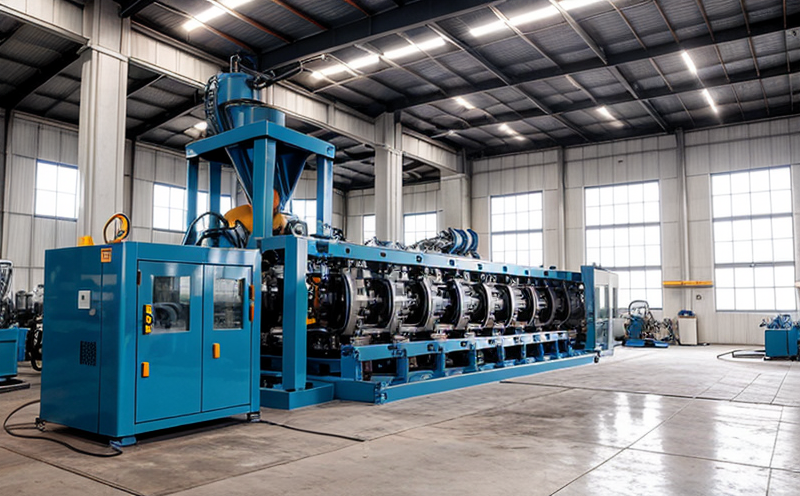ISO 16812 Industrial Valve Flow Performance Testing
The ISO 16812 standard provides a framework for testing and evaluating the flow performance of industrial valves. This service is essential for ensuring that industrial valves meet stringent quality, safety, and operational standards in various sectors such as petrochemicals, power generation, and water treatment.
Industrial valves are critical components in many manufacturing processes, and their reliable operation directly impacts plant efficiency and safety. The ISO 16812 standard ensures that the flow characteristics of industrial valves are accurately measured under controlled conditions, thereby guaranteeing consistent performance across different applications.
The testing process involves several key steps. First, the valve is calibrated using precise flow meters to establish a baseline for comparison. Then, the valve is subjected to various flow rates and pressures, simulating real-world operating conditions. This allows us to assess how the valve behaves under different scenarios, such as low-flow situations or high-pressure operations.
Once testing is complete, detailed reports are generated that include data on the valve's flow characteristics, pressure drop, and leakage rates. These reports serve multiple purposes: they assist in selecting appropriate valves for specific applications, aid in troubleshooting issues related to valve performance, and provide valuable insights into potential improvements or modifications needed.
By adhering strictly to ISO 16812 guidelines, we ensure that our testing results are accurate and reliable. This not only enhances the overall quality of industrial equipment but also promotes compliance with international standards, which is crucial for maintaining a competitive edge in global markets.
This service plays a vital role in ensuring optimal valve performance across diverse industries. For instance, in the petrochemical sector, where valves handle highly corrosive fluids at extreme temperatures and pressures, accurate flow testing is critical to prevent costly downtime due to equipment failure. Similarly, in power generation plants, reliable valves are essential for efficient steam or gas flow control.
The ISO 16812 standard also emphasizes the importance of considering environmental factors during valve design and selection. By understanding these factors early in the process, manufacturers can choose valves that not only meet performance requirements but also minimize their ecological footprint.
Scope and Methodology
The scope of ISO 16812 Industrial Valve Flow Performance Testing is comprehensive and covers a wide range of valve types used in industrial settings. This includes gate valves, globe valves, check valves, ball valves, and more.
Calibration: The first step involves calibrating the flow meters to ensure accurate measurement throughout the testing process.
Setup: Valves are installed in a test loop designed to simulate real-world operating conditions. Pressure and temperature control systems help maintain consistent parameters during tests.
Testing: The valve is subjected to various flow rates, pressures, and temperatures specified by the ISO 16812 standard. This allows for thorough evaluation of its performance characteristics.
Data Collection: Detailed records are kept of all test parameters and results. This includes readings from pressure gauges, temperature sensors, and flow meters.
Analysis: Collected data is analyzed to determine the valve's compliance with ISO 16812 requirements regarding flow rate accuracy, pressure drop, and leakage rates.
The methodology ensures that every aspect of valve performance is thoroughly examined. This approach not only guarantees high-quality testing but also provides valuable insights into potential areas for improvement.
Customer Impact and Satisfaction
Enhanced Product Quality: By adhering to ISO 16812 standards, manufacturers can ensure that their valves meet the highest quality benchmarks. This leads to increased customer satisfaction and loyalty.
Compliance Assurance: Adhering to international standards like ISO ensures compliance with regulatory requirements in various countries, simplifying market access for industrial equipment suppliers.
Operational Efficiency: Accurate flow testing helps identify any inefficiencies or potential failures early on, allowing for timely repairs and maintenance. This contributes to smoother operations and reduced downtime.
Innovation Support: Testing according to ISO 16812 allows manufacturers to stay ahead of industry trends by continuously refining valve designs based on rigorous testing protocols.
Our commitment to delivering exceptional service has earned us a reputation for excellence among our clients. Many have praised the accuracy and reliability of our test results, which play a crucial role in their decision-making processes.
Environmental and Sustainability Contributions
Eco-Friendly Design: By ensuring that valves perform optimally under various conditions, ISO 16812 testing supports the development of eco-friendly designs that minimize waste and energy consumption.
Resource Optimization: Accurate flow testing helps manufacturers optimize resource usage, leading to reduced operational costs while maintaining high standards of performance.
Reduced Emissions: By identifying inefficiencies early on through rigorous testing, industries can take necessary steps to reduce emissions and contribute positively towards environmental goals.
We are committed to sustainability and continuously seek ways to integrate eco-friendly practices into our operations. Our ISO 16812 Industrial Valve Flow Performance Testing service is just one example of how we contribute to a greener future.





